[ZX Spectrum, Elephant Software]
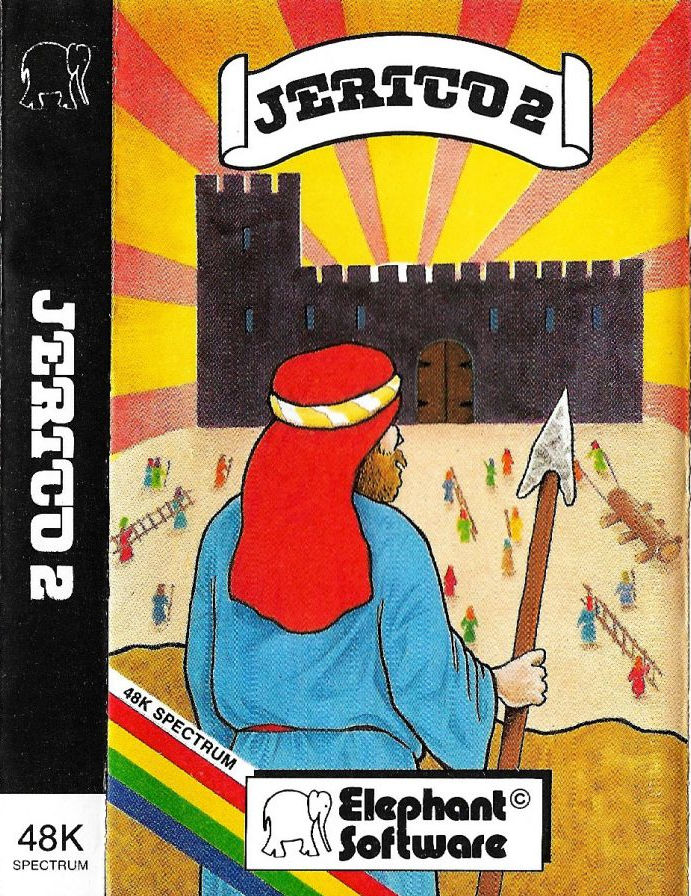
Now the gates of Jericho were securely barred because of the Israelites. No one went out and no one came in. Then the Lord said to Joshua, “See, I have delivered Jericho into your hands, along with its king and its fighting men. March around the city once with all the armed men. Do this for six days. Have seven priests carry trumpets of rams’ horns in front of the ark. On the seventh day, march around the city seven times, with the priests blowing the trumpets. When you hear them sound a long blast on the trumpets, have the whole army give a loud shout; then the wall of the city will collapse and the army will go up, everyone straight in.
— Joshua 1:5
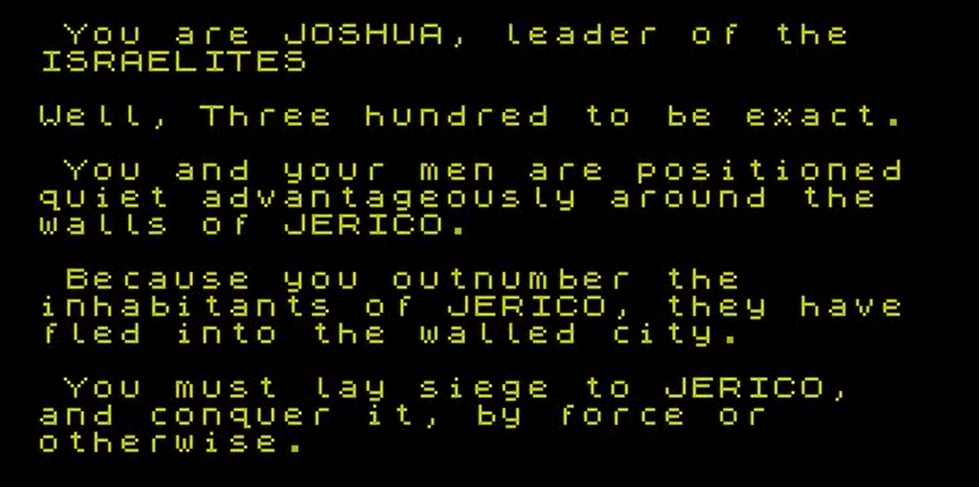
Jerico 2 is a forgotten game that introduces two “firsts” on this blog: the first siege warfare game, and the first biblical-themed game. As far as sieges go, this battle should be a piece of cake as it came with instructions. From reading a walkthrough in the Old Testament, I reckon I am supposed to march around the wall of the city once a day, and then some more marching and some blowing in trumpets on the 7th day. Easy-peasy, adventure game territory.

OH NOES! I forgot the trumpets!
The LORD will not be happy. Oh, well, I am going to do this the gentile way, with ballistae, siege towers, ladders and costly frontal assaults! No cheat code to insta-gib the walls! I am going to fit the battle of Jericho!
I start with 300 men, 1 ballista and ammo for 6 days, 4 carts and some rations.
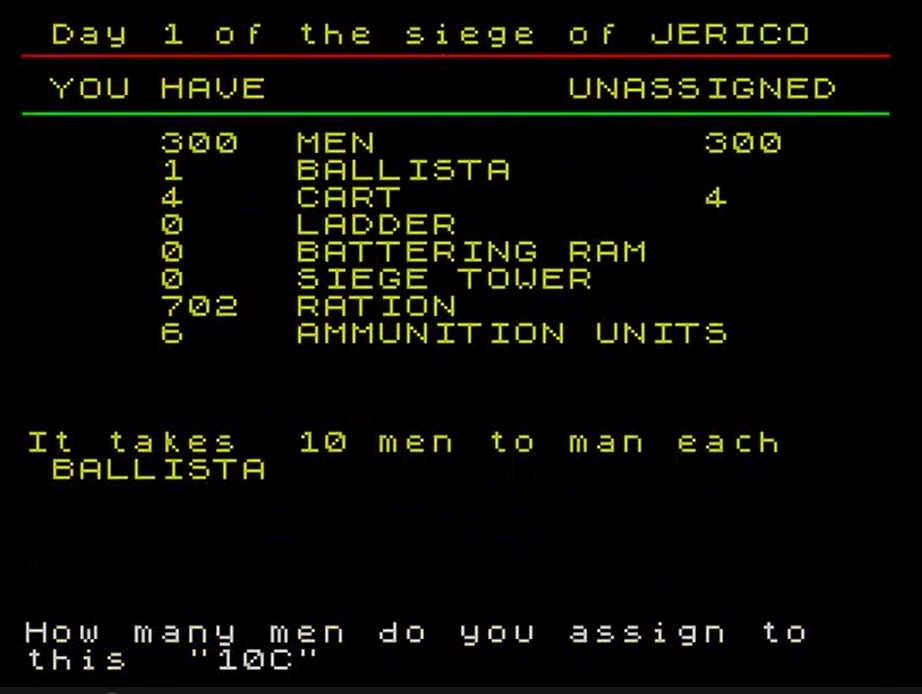
Every day, I must allocate those 300 men between building the various siege engines, foraging for food, finding/making ammunition, digging a tunnel below Jericho’s main tower and guarding the camp.
Three areas of Jericho can be assaulted: the gate (with battering rams), the tower (after it is felled by sapping) and the walls (that can be destroyed by ballista fire). I opt to ignore the gate and focus on the walls (ballistae also inflict losses to the Canaanites) and try to tunnel under the main tower.
On the first day, I am afraid of a Canaanite sally out, so I over-garrison my camp. My soldiers get bored and some of them desert. I guess they would have preferred to be worked to death.
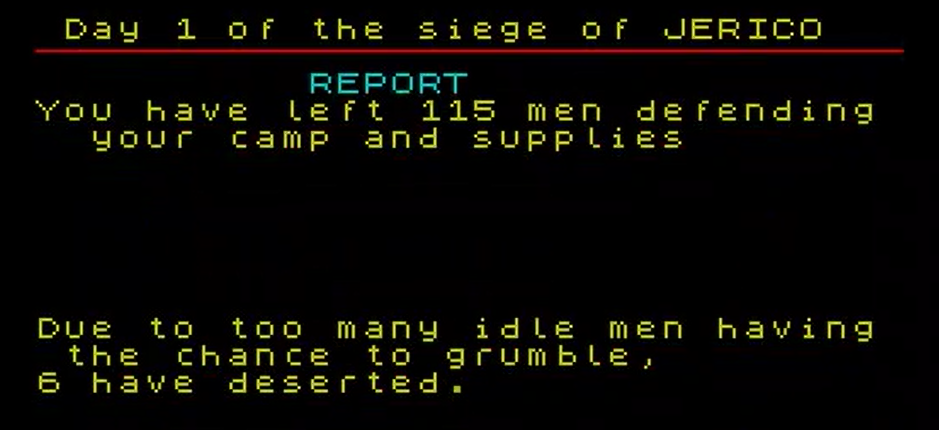
Meanwhile, the Israelites that were not guarding the camp were certainly not idle. Those I sent foraging returned with almost a full day of rations, others built more carts – necessary to fetch food and ammo.
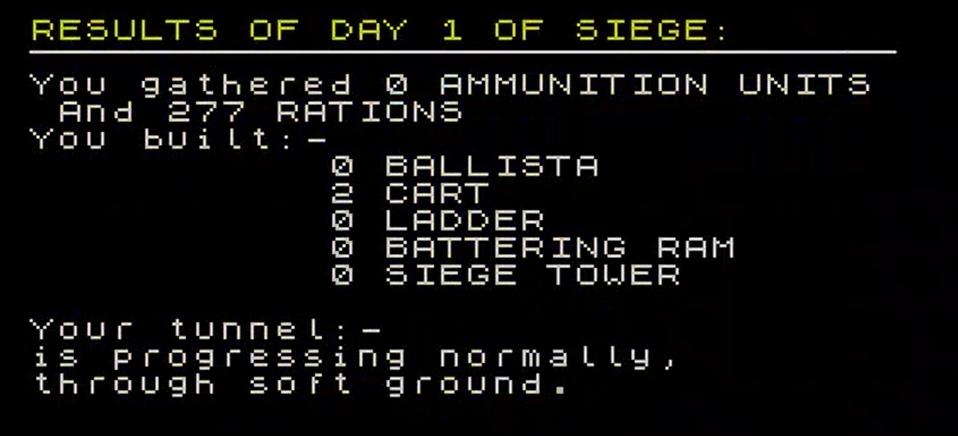
The siege carries on like this for several days. By day 9 I have 4 ballistae in action, 6 carts and 80 men allocated to foraging, 60 men and 3 carts allocated to ammunition, 30 men allocated to tunnelling and the rest either guarding the camp or building ladders and/or siege towers. Most of the deserters came back.
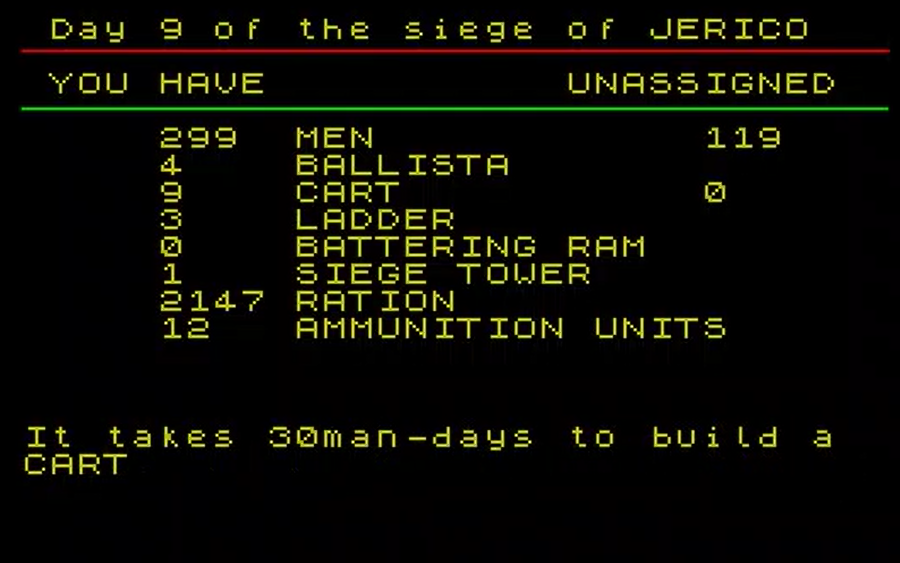
I regularly received news from the garrison. They give me different estimates, but it looks like there are between 100 and 120 defenders in Jericho.

Starting from day 10, the siege camp is hit by inflation. All actions (except tunnelling and using the ballistae) take 50% more effort to accomplish – to represent my men having to fetch the food and the wood from further away. This makes my old balance net negative in terms of resources. I try to compensate by leaving slightly fewer men in the camp. The Canaanites catch wind of this and attack my camp!
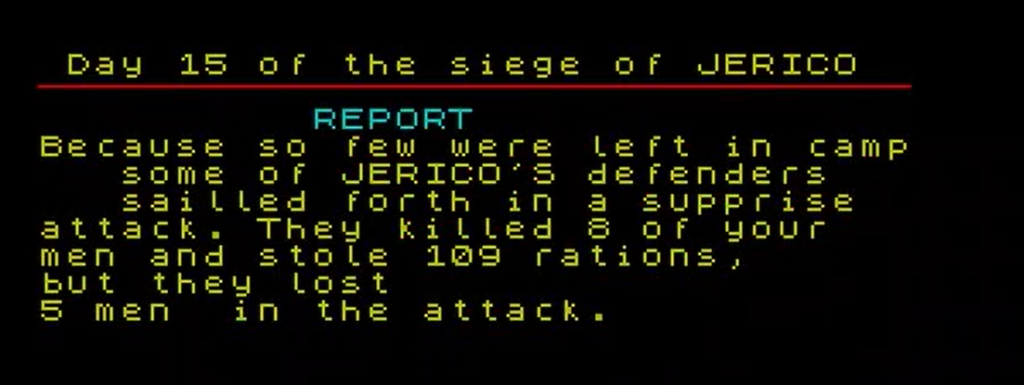
Worse, the same day my tunnel collapses!
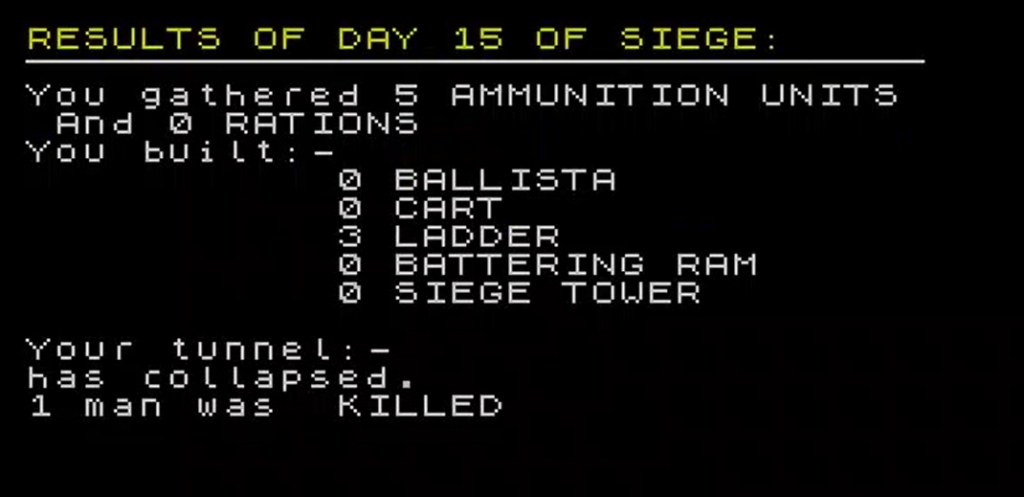
Frustrated and despaired, I launch an assault on the walls, with full support from the ballistae. I don’t know how many losses I inflict on the defenders, but I lose 5 men, one siege tower and all my ladders. I am also out of ammo since obviously, my men could not search for them that day.
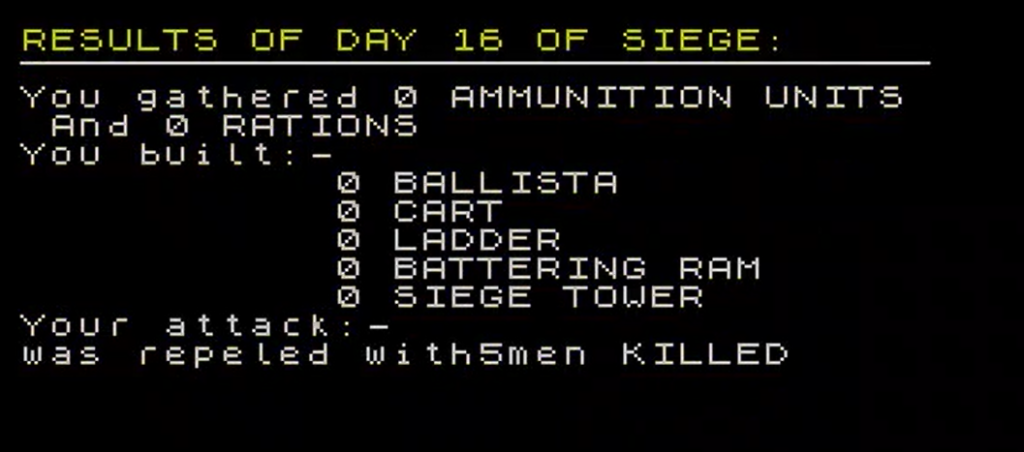
I spend the following days rebuilding ladders and finding ammunition (cancelling my tunnel project helped a bit in terms of manpower). On the 20th day of the siege, the costs increase once more, to double the original cost. Fortunately, I also receive good news:

Jericho is almost out of defenders, even though I don’t know if I killed the rest of them by combat, starvation or bombardment.
On the 21st day, I launch what’s likely to be the last assault on the walls …
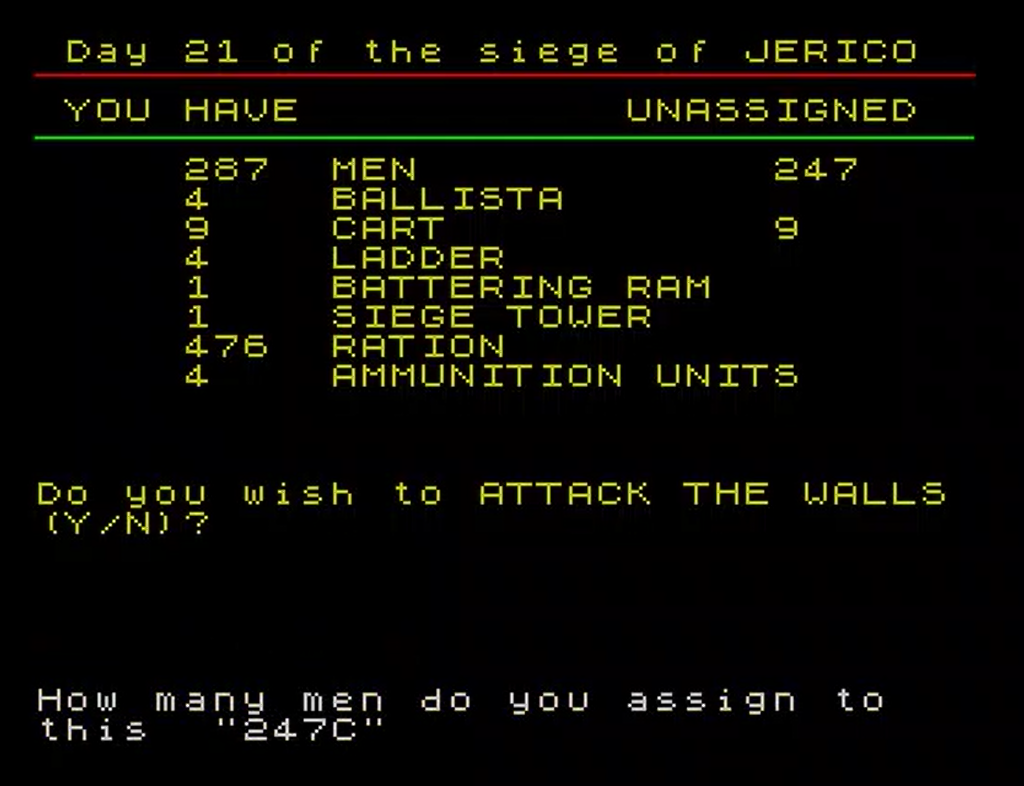
… and the walls came tumblin’ down!
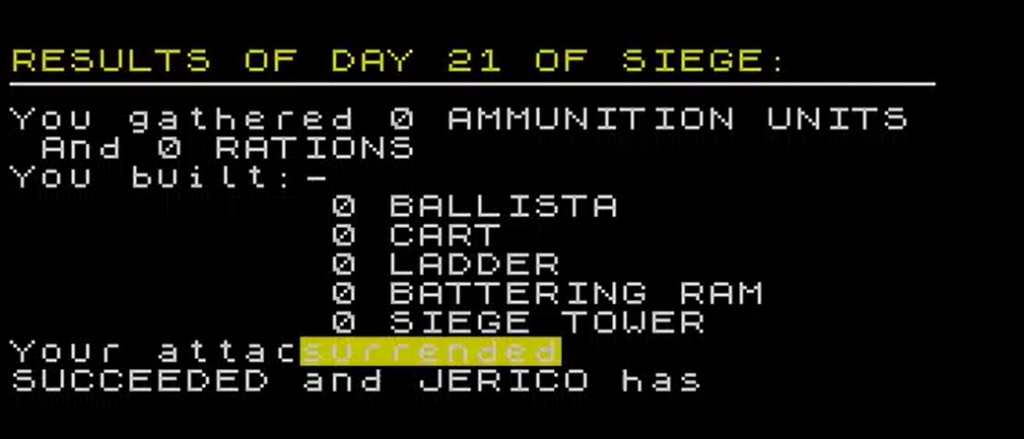
Ratings & Review

Jerico 2 by Dennis Wieckowski, published by Elephant Software, UK
Genre: Siege Warfare
First release: June 1983 on ZX Spectrum, according to an ad in Your Computer Magazine.
Average duration of a campaign: 20 minutes
Total time played: 20 minutes
Complexity: Easy (1/5)
Final Rating: Totally obsolete
Ranking at the time of review: 80/109
Jerico is a minor text-based game by a minor publisher. It has the distinction of being the first “biblical wargame” and the first “siege warfare” game, and little else. At least, it does not overstay its welcome thanks to campaigns that last fewer than 30 minutes.
Elephant Software was a small video game developer/publisher founded by Dennis Wieckowski. As far as I can assume from the limited digital footprints of this company, Wieckowski was frustrated like so many others by the offer of games on the Spectrum (“Not everyone who owns a computer is 10 to 15 years old and mad on arcade games. Space Invaders isn’t my cup of tea“) and decided to make his own games. Elephant Software released its two first games Vanquisher and Paragram in 1983.
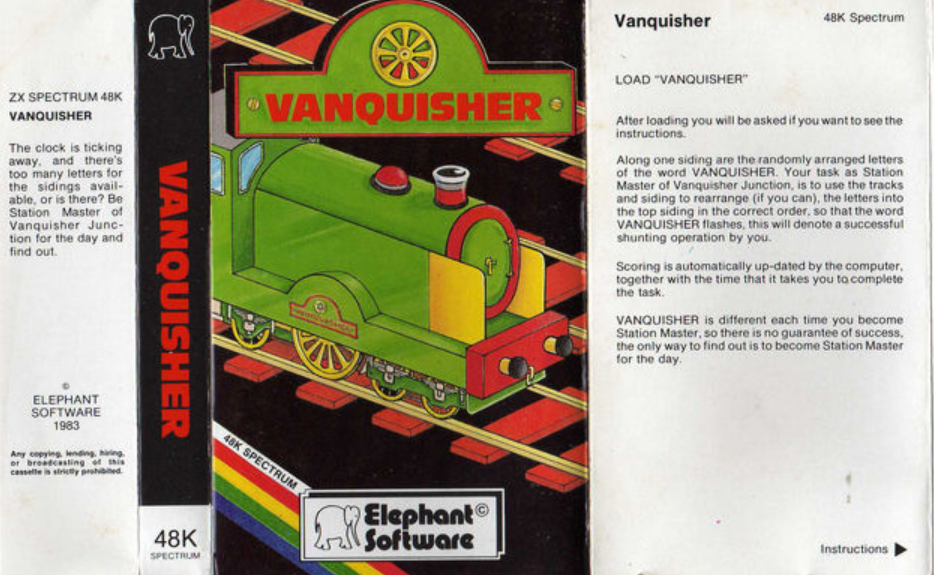
The next release was a bundle (one game on each side of the cassette) of Farmer Horace and Jerico 2. We know Jerico 2 (note there is no mention of a Jerico 1 anywhere). Farmer Horace is a traditional farming game which bears no thematic relation with Jerico 2.
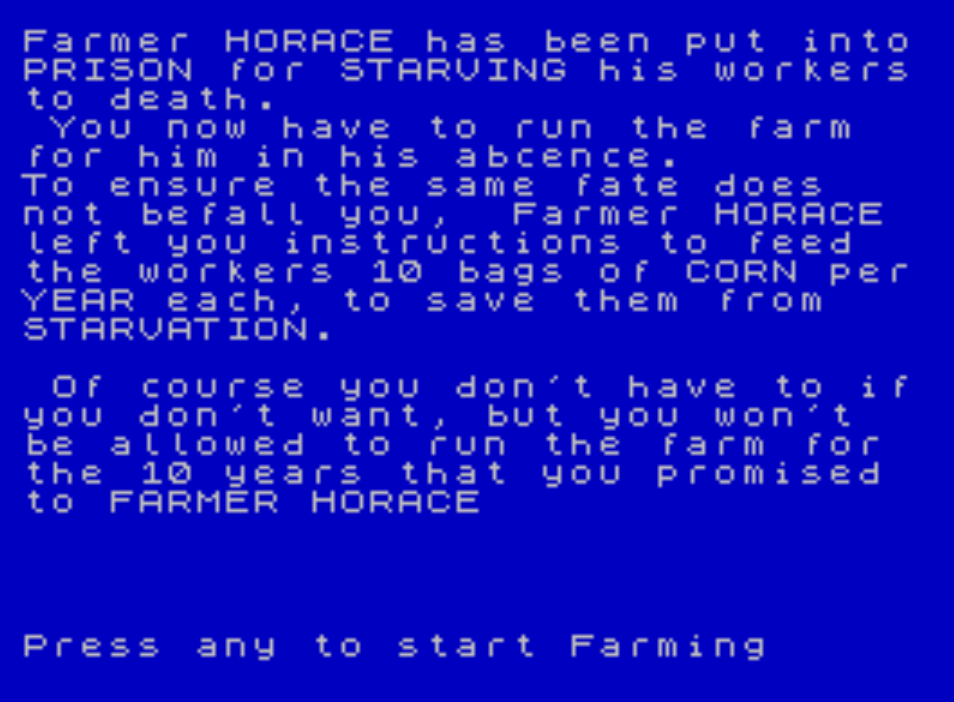
Running his own company does not seem to have been very profitable for Wieckowski, and in a letter to Popular Computing Weekly (published August 1983) Wieckowski shares his struggle through a detailed P&L of a 1983 boutique video game company, blaming (already!) the hefty price-to-customer to the cost of marketing :
“If the buyer would purchase plain, wrapped, unadvertised software by mail order for £2, then it would become available. But they won’t, so they must pay the price for being wooed by exciting inlays, colourful advertising and over-the-counter availability“
In 1984, Elephant Software released Kosmik Pirate, a game that was violently panned in the two reviews it received and was apparently so bad it received a mock prize called the “Your Spectrum Miss of the Month”. It is not a surprise then that Elephant Software ceased all activity shortly after this failure.
A. Immersion: Terrible. It is text-based only, and while I like the theme the game actually does not feel biblical at all – no one was smitten.
B. UI, Clarify of rules and outcomes: Terrible. How close is my tunnel to the tower? How many defenders did I kill in combat? What’s the status of the wall after days of bombardment? The game does not say. The game is also easy to crash, for instance if you press “enter” at the wrong moment,
C. Systems: Very poor. The game is barebone with no random event (except Canaanite deserters), artifical mechanisms that serve no gameplay purpose (why would my men desert when left in the camp – aren’t they more likely to desert when out of the camp fetching stuff?) and fake choices (you have no gameplay reason to prefer say battering rams to tunneling given you don’t see any counter-action to either by the Canaanites).
D. Scenario design & balancing: Very poor. There is no difficulty slider and I won at my first attempt. I don’t think the defenders ever had a chance.
E. Did I make interesting decisions? Barely. I feel most “sane” decisions would have brought me to my victory.
F. Final rating : Totally obsolete. The 20 minutes I played the game were fun – which saves the game from the bottom 20% of my “order of preference” list – but I have no desire to come back to it.
Contemporary Reviews
Jerico 2 received a short description in the Crash “Living” Guide (February 1984 for the first mention) and then two real reviews that I could find :
- a short and positive review in the September 1984 issue Home Computing Weekly (“this is an excellent program of its type“),
- a short and negative review in the May 1984 issue of Personal Computer Games (“Jerico 2 manages to hold one’s interest for a few hours. After that…”).